Business Law and Tort Principles
VerifiedAdded on 2020/10/22
|12
|3820
|60
AI Summary
This assignment discusses the importance of business law in carrying out activities without hindrance. It highlights the need for companies to comply with business laws, provide correct representation to clients, and act in accordance with articles and law as fiduciary relationships. The assignment also covers the meaning, laws, and principles governing torts, including damages, misrepresentation, and unfair dismissal.
Contribute Materials
Your contribution can guide someone’s learning journey. Share your
documents today.
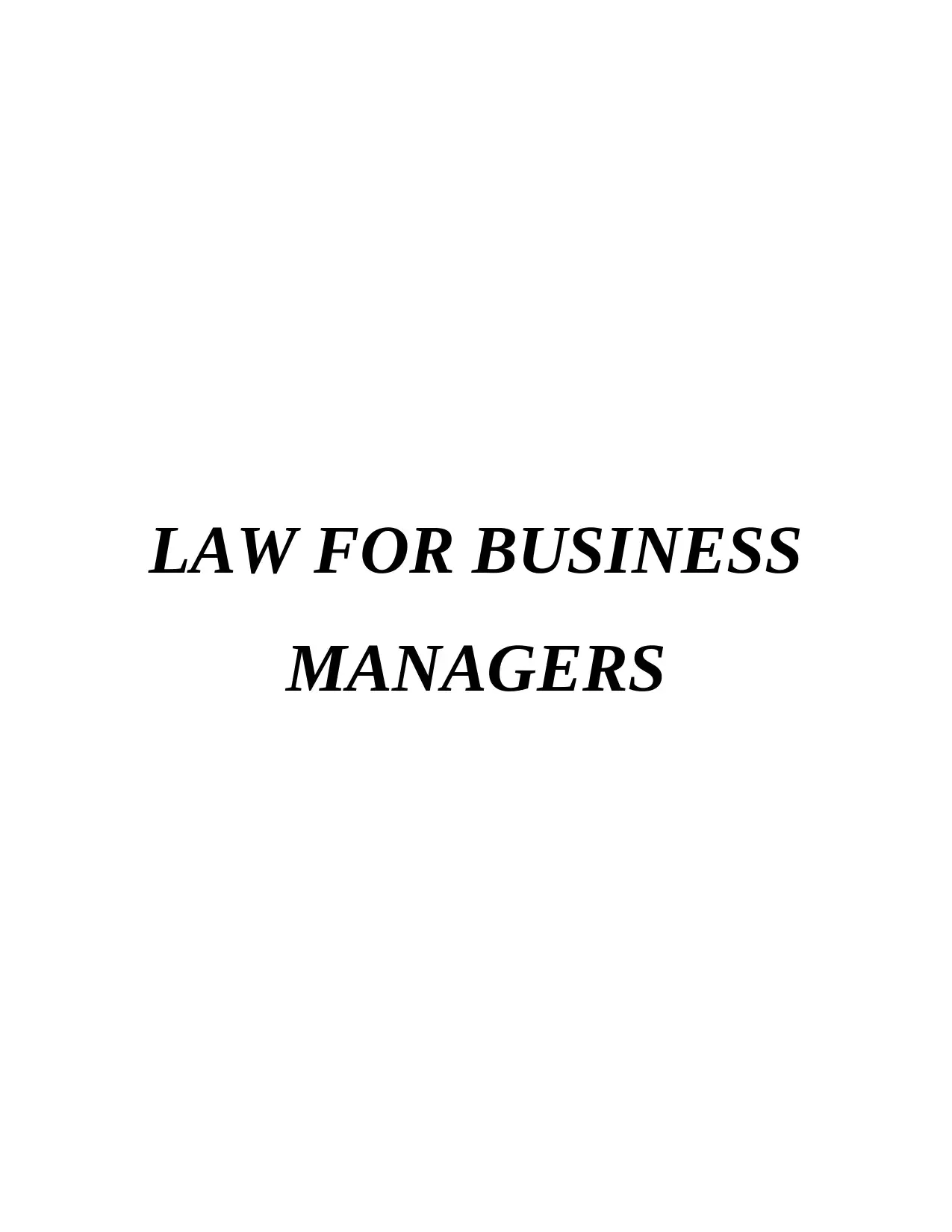
LAW FOR BUSINESS
MANAGERS
MANAGERS
Secure Best Marks with AI Grader
Need help grading? Try our AI Grader for instant feedback on your assignments.
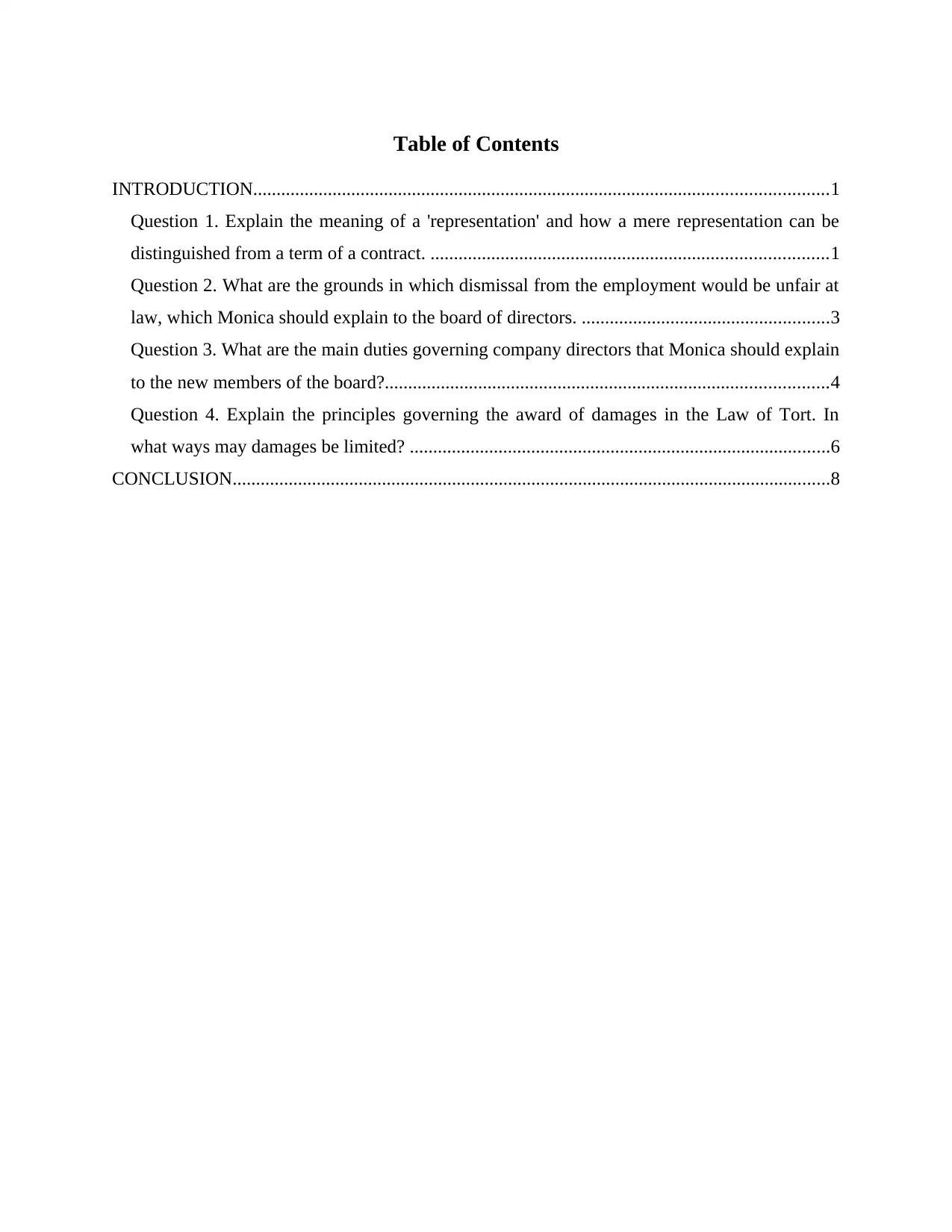
Table of Contents
INTRODUCTION...........................................................................................................................1
Question 1. Explain the meaning of a 'representation' and how a mere representation can be
distinguished from a term of a contract. .....................................................................................1
Question 2. What are the grounds in which dismissal from the employment would be unfair at
law, which Monica should explain to the board of directors. .....................................................3
Question 3. What are the main duties governing company directors that Monica should explain
to the new members of the board?...............................................................................................4
Question 4. Explain the principles governing the award of damages in the Law of Tort. In
what ways may damages be limited? ..........................................................................................6
CONCLUSION................................................................................................................................8
INTRODUCTION...........................................................................................................................1
Question 1. Explain the meaning of a 'representation' and how a mere representation can be
distinguished from a term of a contract. .....................................................................................1
Question 2. What are the grounds in which dismissal from the employment would be unfair at
law, which Monica should explain to the board of directors. .....................................................3
Question 3. What are the main duties governing company directors that Monica should explain
to the new members of the board?...............................................................................................4
Question 4. Explain the principles governing the award of damages in the Law of Tort. In
what ways may damages be limited? ..........................................................................................6
CONCLUSION................................................................................................................................8

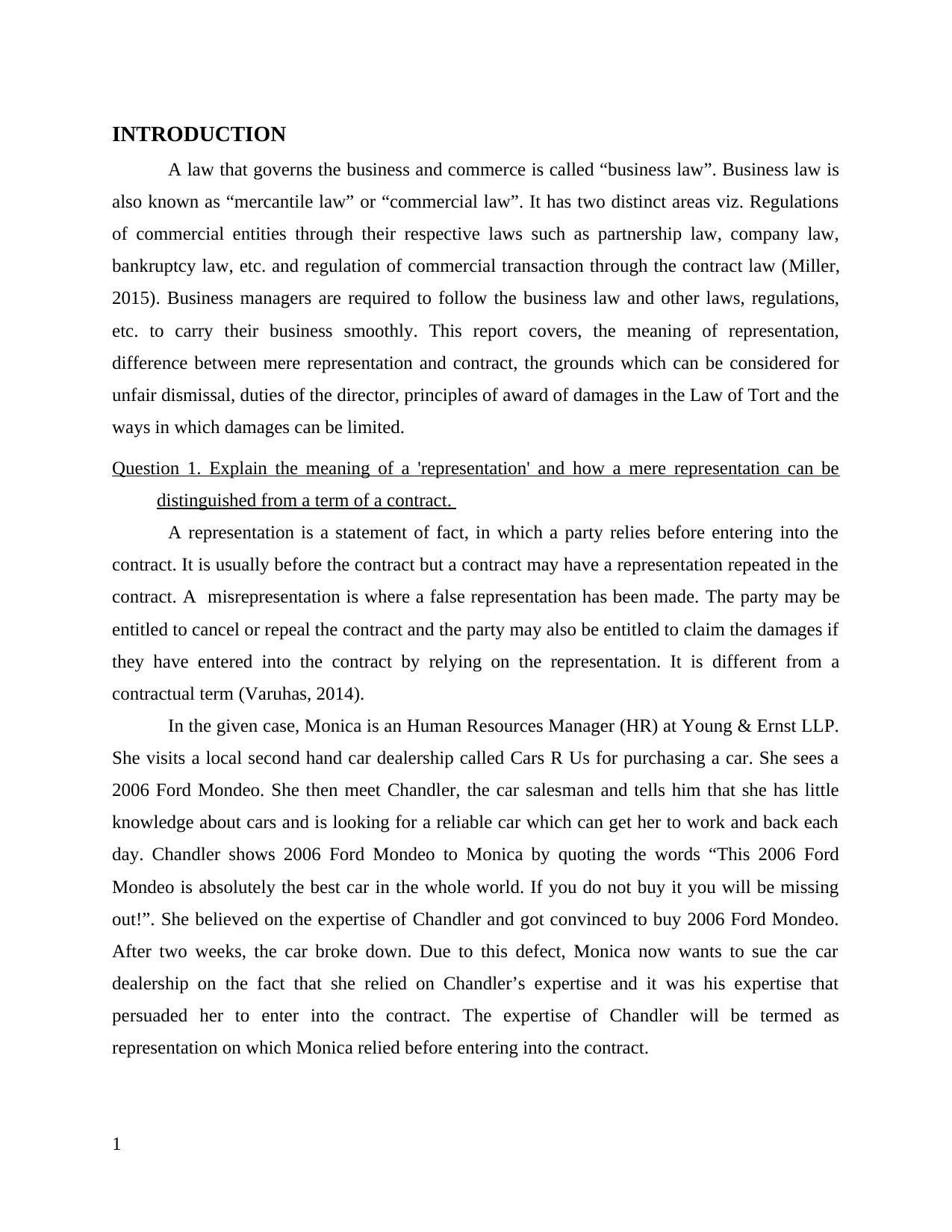
INTRODUCTION
A law that governs the business and commerce is called “business law”. Business law is
also known as “mercantile law” or “commercial law”. It has two distinct areas viz. Regulations
of commercial entities through their respective laws such as partnership law, company law,
bankruptcy law, etc. and regulation of commercial transaction through the contract law (Miller,
2015). Business managers are required to follow the business law and other laws, regulations,
etc. to carry their business smoothly. This report covers, the meaning of representation,
difference between mere representation and contract, the grounds which can be considered for
unfair dismissal, duties of the director, principles of award of damages in the Law of Tort and the
ways in which damages can be limited.
Question 1. Explain the meaning of a 'representation' and how a mere representation can be
distinguished from a term of a contract.
A representation is a statement of fact, in which a party relies before entering into the
contract. It is usually before the contract but a contract may have a representation repeated in the
contract. A misrepresentation is where a false representation has been made. The party may be
entitled to cancel or repeal the contract and the party may also be entitled to claim the damages if
they have entered into the contract by relying on the representation. It is different from a
contractual term (Varuhas, 2014).
In the given case, Monica is an Human Resources Manager (HR) at Young & Ernst LLP.
She visits a local second hand car dealership called Cars R Us for purchasing a car. She sees a
2006 Ford Mondeo. She then meet Chandler, the car salesman and tells him that she has little
knowledge about cars and is looking for a reliable car which can get her to work and back each
day. Chandler shows 2006 Ford Mondeo to Monica by quoting the words “This 2006 Ford
Mondeo is absolutely the best car in the whole world. If you do not buy it you will be missing
out!”. She believed on the expertise of Chandler and got convinced to buy 2006 Ford Mondeo.
After two weeks, the car broke down. Due to this defect, Monica now wants to sue the car
dealership on the fact that she relied on Chandler’s expertise and it was his expertise that
persuaded her to enter into the contract. The expertise of Chandler will be termed as
representation on which Monica relied before entering into the contract.
1
A law that governs the business and commerce is called “business law”. Business law is
also known as “mercantile law” or “commercial law”. It has two distinct areas viz. Regulations
of commercial entities through their respective laws such as partnership law, company law,
bankruptcy law, etc. and regulation of commercial transaction through the contract law (Miller,
2015). Business managers are required to follow the business law and other laws, regulations,
etc. to carry their business smoothly. This report covers, the meaning of representation,
difference between mere representation and contract, the grounds which can be considered for
unfair dismissal, duties of the director, principles of award of damages in the Law of Tort and the
ways in which damages can be limited.
Question 1. Explain the meaning of a 'representation' and how a mere representation can be
distinguished from a term of a contract.
A representation is a statement of fact, in which a party relies before entering into the
contract. It is usually before the contract but a contract may have a representation repeated in the
contract. A misrepresentation is where a false representation has been made. The party may be
entitled to cancel or repeal the contract and the party may also be entitled to claim the damages if
they have entered into the contract by relying on the representation. It is different from a
contractual term (Varuhas, 2014).
In the given case, Monica is an Human Resources Manager (HR) at Young & Ernst LLP.
She visits a local second hand car dealership called Cars R Us for purchasing a car. She sees a
2006 Ford Mondeo. She then meet Chandler, the car salesman and tells him that she has little
knowledge about cars and is looking for a reliable car which can get her to work and back each
day. Chandler shows 2006 Ford Mondeo to Monica by quoting the words “This 2006 Ford
Mondeo is absolutely the best car in the whole world. If you do not buy it you will be missing
out!”. She believed on the expertise of Chandler and got convinced to buy 2006 Ford Mondeo.
After two weeks, the car broke down. Due to this defect, Monica now wants to sue the car
dealership on the fact that she relied on Chandler’s expertise and it was his expertise that
persuaded her to enter into the contract. The expertise of Chandler will be termed as
representation on which Monica relied before entering into the contract.
1
Secure Best Marks with AI Grader
Need help grading? Try our AI Grader for instant feedback on your assignments.
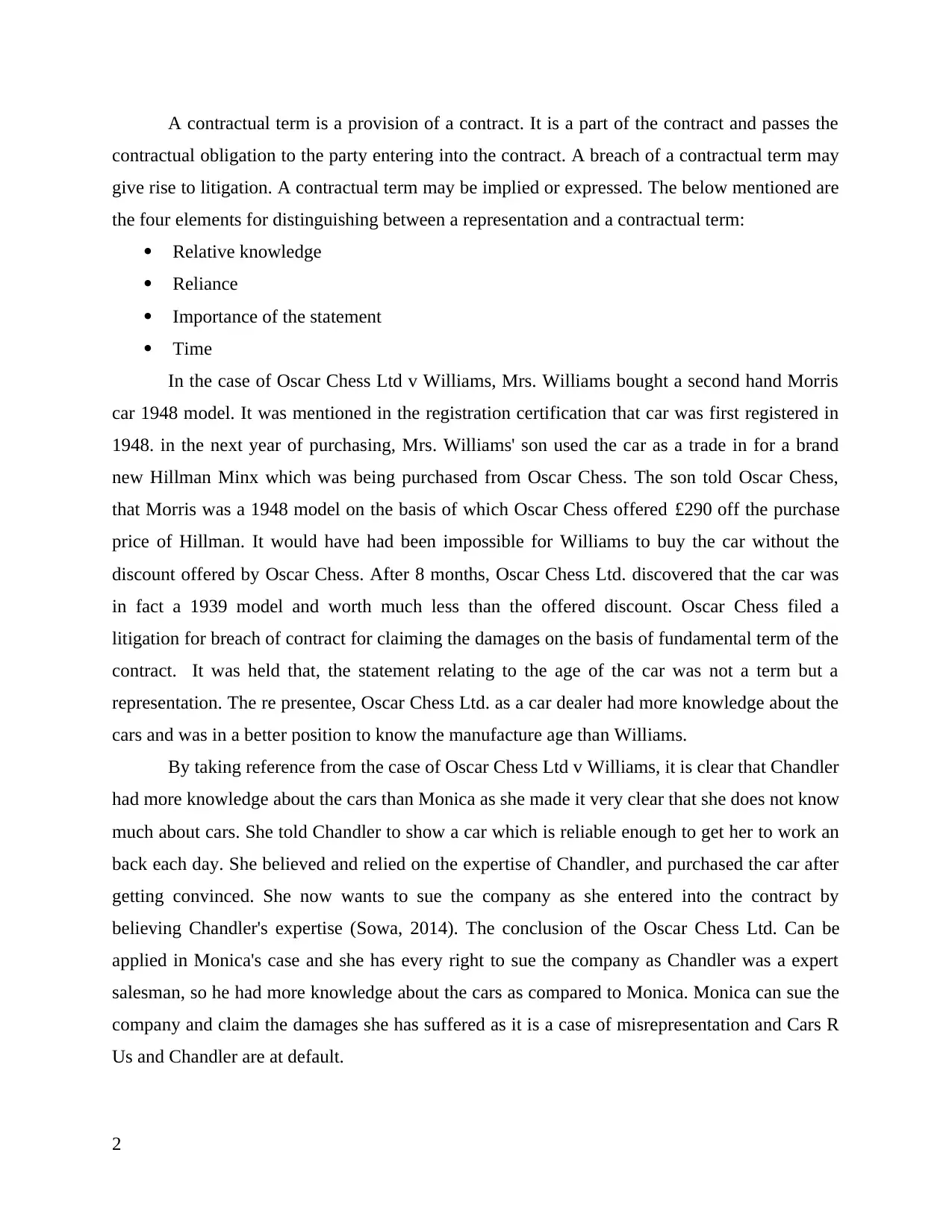
A contractual term is a provision of a contract. It is a part of the contract and passes the
contractual obligation to the party entering into the contract. A breach of a contractual term may
give rise to litigation. A contractual term may be implied or expressed. The below mentioned are
the four elements for distinguishing between a representation and a contractual term:
Relative knowledge
Reliance
Importance of the statement
Time
In the case of Oscar Chess Ltd v Williams, Mrs. Williams bought a second hand Morris
car 1948 model. It was mentioned in the registration certification that car was first registered in
1948. in the next year of purchasing, Mrs. Williams' son used the car as a trade in for a brand
new Hillman Minx which was being purchased from Oscar Chess. The son told Oscar Chess,
that Morris was a 1948 model on the basis of which Oscar Chess offered £290 off the purchase
price of Hillman. It would have had been impossible for Williams to buy the car without the
discount offered by Oscar Chess. After 8 months, Oscar Chess Ltd. discovered that the car was
in fact a 1939 model and worth much less than the offered discount. Oscar Chess filed a
litigation for breach of contract for claiming the damages on the basis of fundamental term of the
contract. It was held that, the statement relating to the age of the car was not a term but a
representation. The re presentee, Oscar Chess Ltd. as a car dealer had more knowledge about the
cars and was in a better position to know the manufacture age than Williams.
By taking reference from the case of Oscar Chess Ltd v Williams, it is clear that Chandler
had more knowledge about the cars than Monica as she made it very clear that she does not know
much about cars. She told Chandler to show a car which is reliable enough to get her to work an
back each day. She believed and relied on the expertise of Chandler, and purchased the car after
getting convinced. She now wants to sue the company as she entered into the contract by
believing Chandler's expertise (Sowa, 2014). The conclusion of the Oscar Chess Ltd. Can be
applied in Monica's case and she has every right to sue the company as Chandler was a expert
salesman, so he had more knowledge about the cars as compared to Monica. Monica can sue the
company and claim the damages she has suffered as it is a case of misrepresentation and Cars R
Us and Chandler are at default.
2
contractual obligation to the party entering into the contract. A breach of a contractual term may
give rise to litigation. A contractual term may be implied or expressed. The below mentioned are
the four elements for distinguishing between a representation and a contractual term:
Relative knowledge
Reliance
Importance of the statement
Time
In the case of Oscar Chess Ltd v Williams, Mrs. Williams bought a second hand Morris
car 1948 model. It was mentioned in the registration certification that car was first registered in
1948. in the next year of purchasing, Mrs. Williams' son used the car as a trade in for a brand
new Hillman Minx which was being purchased from Oscar Chess. The son told Oscar Chess,
that Morris was a 1948 model on the basis of which Oscar Chess offered £290 off the purchase
price of Hillman. It would have had been impossible for Williams to buy the car without the
discount offered by Oscar Chess. After 8 months, Oscar Chess Ltd. discovered that the car was
in fact a 1939 model and worth much less than the offered discount. Oscar Chess filed a
litigation for breach of contract for claiming the damages on the basis of fundamental term of the
contract. It was held that, the statement relating to the age of the car was not a term but a
representation. The re presentee, Oscar Chess Ltd. as a car dealer had more knowledge about the
cars and was in a better position to know the manufacture age than Williams.
By taking reference from the case of Oscar Chess Ltd v Williams, it is clear that Chandler
had more knowledge about the cars than Monica as she made it very clear that she does not know
much about cars. She told Chandler to show a car which is reliable enough to get her to work an
back each day. She believed and relied on the expertise of Chandler, and purchased the car after
getting convinced. She now wants to sue the company as she entered into the contract by
believing Chandler's expertise (Sowa, 2014). The conclusion of the Oscar Chess Ltd. Can be
applied in Monica's case and she has every right to sue the company as Chandler was a expert
salesman, so he had more knowledge about the cars as compared to Monica. Monica can sue the
company and claim the damages she has suffered as it is a case of misrepresentation and Cars R
Us and Chandler are at default.
2
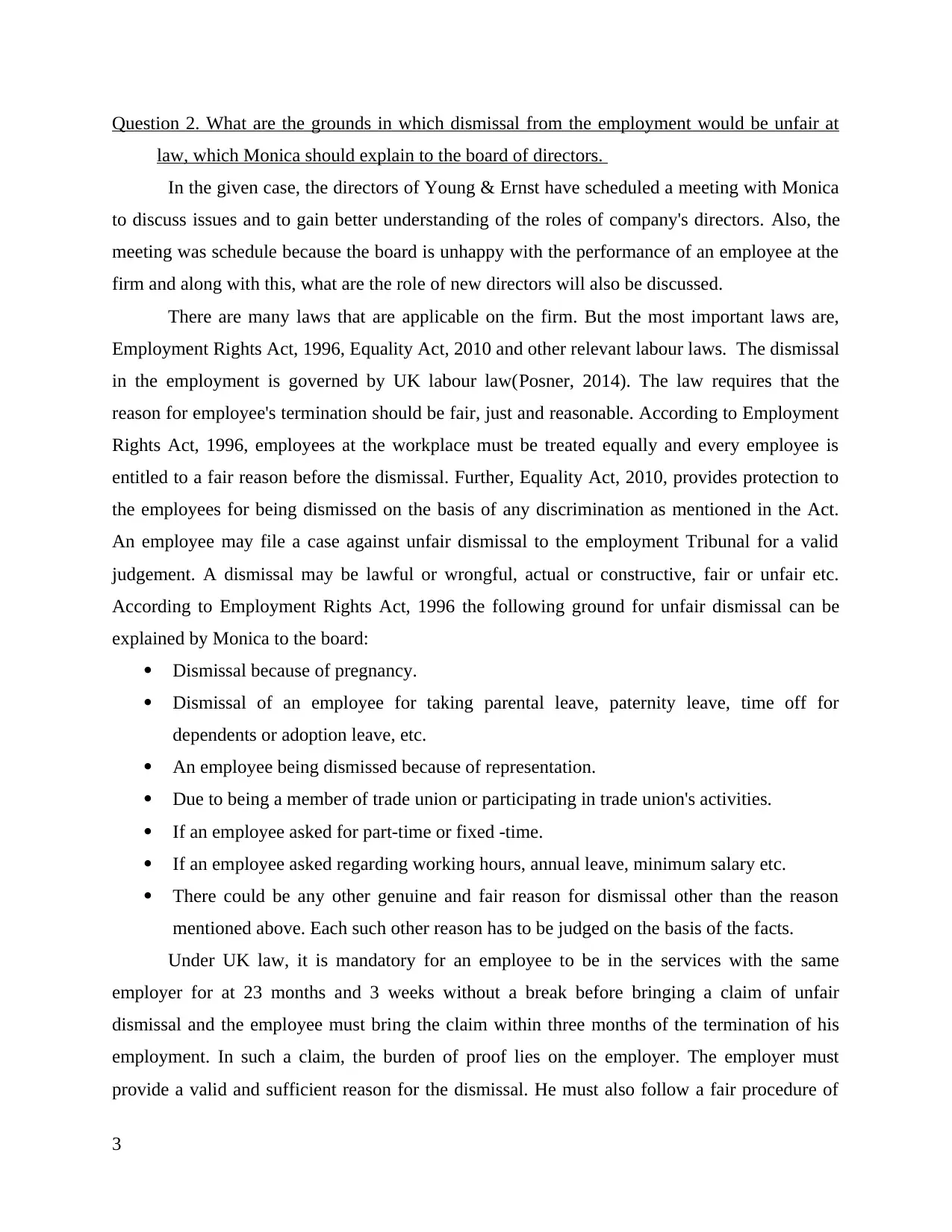
Question 2. What are the grounds in which dismissal from the employment would be unfair at
law, which Monica should explain to the board of directors.
In the given case, the directors of Young & Ernst have scheduled a meeting with Monica
to discuss issues and to gain better understanding of the roles of company's directors. Also, the
meeting was schedule because the board is unhappy with the performance of an employee at the
firm and along with this, what are the role of new directors will also be discussed.
There are many laws that are applicable on the firm. But the most important laws are,
Employment Rights Act, 1996, Equality Act, 2010 and other relevant labour laws. The dismissal
in the employment is governed by UK labour law(Posner, 2014). The law requires that the
reason for employee's termination should be fair, just and reasonable. According to Employment
Rights Act, 1996, employees at the workplace must be treated equally and every employee is
entitled to a fair reason before the dismissal. Further, Equality Act, 2010, provides protection to
the employees for being dismissed on the basis of any discrimination as mentioned in the Act.
An employee may file a case against unfair dismissal to the employment Tribunal for a valid
judgement. A dismissal may be lawful or wrongful, actual or constructive, fair or unfair etc.
According to Employment Rights Act, 1996 the following ground for unfair dismissal can be
explained by Monica to the board:
Dismissal because of pregnancy.
Dismissal of an employee for taking parental leave, paternity leave, time off for
dependents or adoption leave, etc.
An employee being dismissed because of representation.
Due to being a member of trade union or participating in trade union's activities.
If an employee asked for part-time or fixed -time.
If an employee asked regarding working hours, annual leave, minimum salary etc.
There could be any other genuine and fair reason for dismissal other than the reason
mentioned above. Each such other reason has to be judged on the basis of the facts.
Under UK law, it is mandatory for an employee to be in the services with the same
employer for at 23 months and 3 weeks without a break before bringing a claim of unfair
dismissal and the employee must bring the claim within three months of the termination of his
employment. In such a claim, the burden of proof lies on the employer. The employer must
provide a valid and sufficient reason for the dismissal. He must also follow a fair procedure of
3
law, which Monica should explain to the board of directors.
In the given case, the directors of Young & Ernst have scheduled a meeting with Monica
to discuss issues and to gain better understanding of the roles of company's directors. Also, the
meeting was schedule because the board is unhappy with the performance of an employee at the
firm and along with this, what are the role of new directors will also be discussed.
There are many laws that are applicable on the firm. But the most important laws are,
Employment Rights Act, 1996, Equality Act, 2010 and other relevant labour laws. The dismissal
in the employment is governed by UK labour law(Posner, 2014). The law requires that the
reason for employee's termination should be fair, just and reasonable. According to Employment
Rights Act, 1996, employees at the workplace must be treated equally and every employee is
entitled to a fair reason before the dismissal. Further, Equality Act, 2010, provides protection to
the employees for being dismissed on the basis of any discrimination as mentioned in the Act.
An employee may file a case against unfair dismissal to the employment Tribunal for a valid
judgement. A dismissal may be lawful or wrongful, actual or constructive, fair or unfair etc.
According to Employment Rights Act, 1996 the following ground for unfair dismissal can be
explained by Monica to the board:
Dismissal because of pregnancy.
Dismissal of an employee for taking parental leave, paternity leave, time off for
dependents or adoption leave, etc.
An employee being dismissed because of representation.
Due to being a member of trade union or participating in trade union's activities.
If an employee asked for part-time or fixed -time.
If an employee asked regarding working hours, annual leave, minimum salary etc.
There could be any other genuine and fair reason for dismissal other than the reason
mentioned above. Each such other reason has to be judged on the basis of the facts.
Under UK law, it is mandatory for an employee to be in the services with the same
employer for at 23 months and 3 weeks without a break before bringing a claim of unfair
dismissal and the employee must bring the claim within three months of the termination of his
employment. In such a claim, the burden of proof lies on the employer. The employer must
provide a valid and sufficient reason for the dismissal. He must also follow a fair procedure of
3
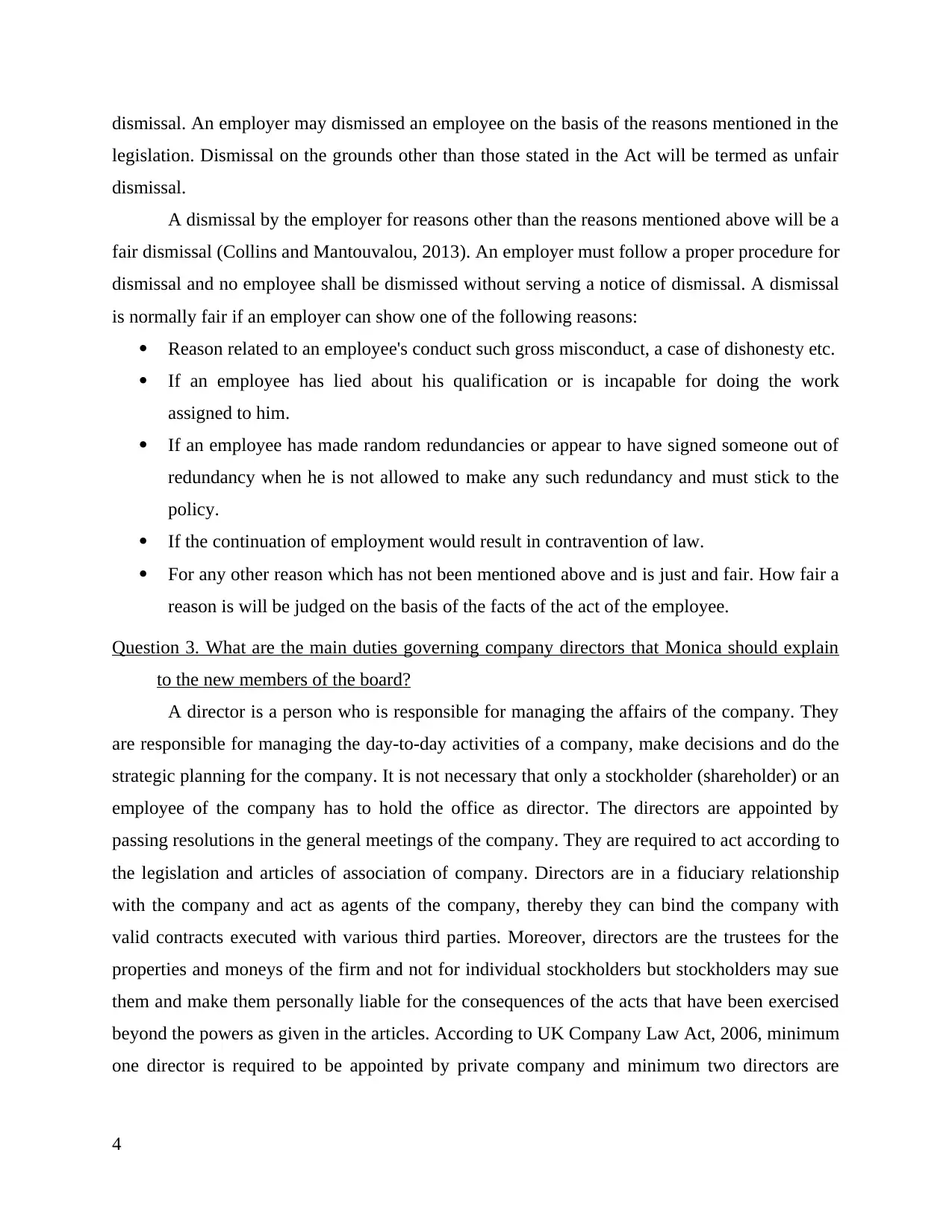
dismissal. An employer may dismissed an employee on the basis of the reasons mentioned in the
legislation. Dismissal on the grounds other than those stated in the Act will be termed as unfair
dismissal.
A dismissal by the employer for reasons other than the reasons mentioned above will be a
fair dismissal (Collins and Mantouvalou, 2013). An employer must follow a proper procedure for
dismissal and no employee shall be dismissed without serving a notice of dismissal. A dismissal
is normally fair if an employer can show one of the following reasons:
Reason related to an employee's conduct such gross misconduct, a case of dishonesty etc.
If an employee has lied about his qualification or is incapable for doing the work
assigned to him.
If an employee has made random redundancies or appear to have signed someone out of
redundancy when he is not allowed to make any such redundancy and must stick to the
policy.
If the continuation of employment would result in contravention of law.
For any other reason which has not been mentioned above and is just and fair. How fair a
reason is will be judged on the basis of the facts of the act of the employee.
Question 3. What are the main duties governing company directors that Monica should explain
to the new members of the board?
A director is a person who is responsible for managing the affairs of the company. They
are responsible for managing the day-to-day activities of a company, make decisions and do the
strategic planning for the company. It is not necessary that only a stockholder (shareholder) or an
employee of the company has to hold the office as director. The directors are appointed by
passing resolutions in the general meetings of the company. They are required to act according to
the legislation and articles of association of company. Directors are in a fiduciary relationship
with the company and act as agents of the company, thereby they can bind the company with
valid contracts executed with various third parties. Moreover, directors are the trustees for the
properties and moneys of the firm and not for individual stockholders but stockholders may sue
them and make them personally liable for the consequences of the acts that have been exercised
beyond the powers as given in the articles. According to UK Company Law Act, 2006, minimum
one director is required to be appointed by private company and minimum two directors are
4
legislation. Dismissal on the grounds other than those stated in the Act will be termed as unfair
dismissal.
A dismissal by the employer for reasons other than the reasons mentioned above will be a
fair dismissal (Collins and Mantouvalou, 2013). An employer must follow a proper procedure for
dismissal and no employee shall be dismissed without serving a notice of dismissal. A dismissal
is normally fair if an employer can show one of the following reasons:
Reason related to an employee's conduct such gross misconduct, a case of dishonesty etc.
If an employee has lied about his qualification or is incapable for doing the work
assigned to him.
If an employee has made random redundancies or appear to have signed someone out of
redundancy when he is not allowed to make any such redundancy and must stick to the
policy.
If the continuation of employment would result in contravention of law.
For any other reason which has not been mentioned above and is just and fair. How fair a
reason is will be judged on the basis of the facts of the act of the employee.
Question 3. What are the main duties governing company directors that Monica should explain
to the new members of the board?
A director is a person who is responsible for managing the affairs of the company. They
are responsible for managing the day-to-day activities of a company, make decisions and do the
strategic planning for the company. It is not necessary that only a stockholder (shareholder) or an
employee of the company has to hold the office as director. The directors are appointed by
passing resolutions in the general meetings of the company. They are required to act according to
the legislation and articles of association of company. Directors are in a fiduciary relationship
with the company and act as agents of the company, thereby they can bind the company with
valid contracts executed with various third parties. Moreover, directors are the trustees for the
properties and moneys of the firm and not for individual stockholders but stockholders may sue
them and make them personally liable for the consequences of the acts that have been exercised
beyond the powers as given in the articles. According to UK Company Law Act, 2006, minimum
one director is required to be appointed by private company and minimum two directors are
4
Paraphrase This Document
Need a fresh take? Get an instant paraphrase of this document with our AI Paraphraser
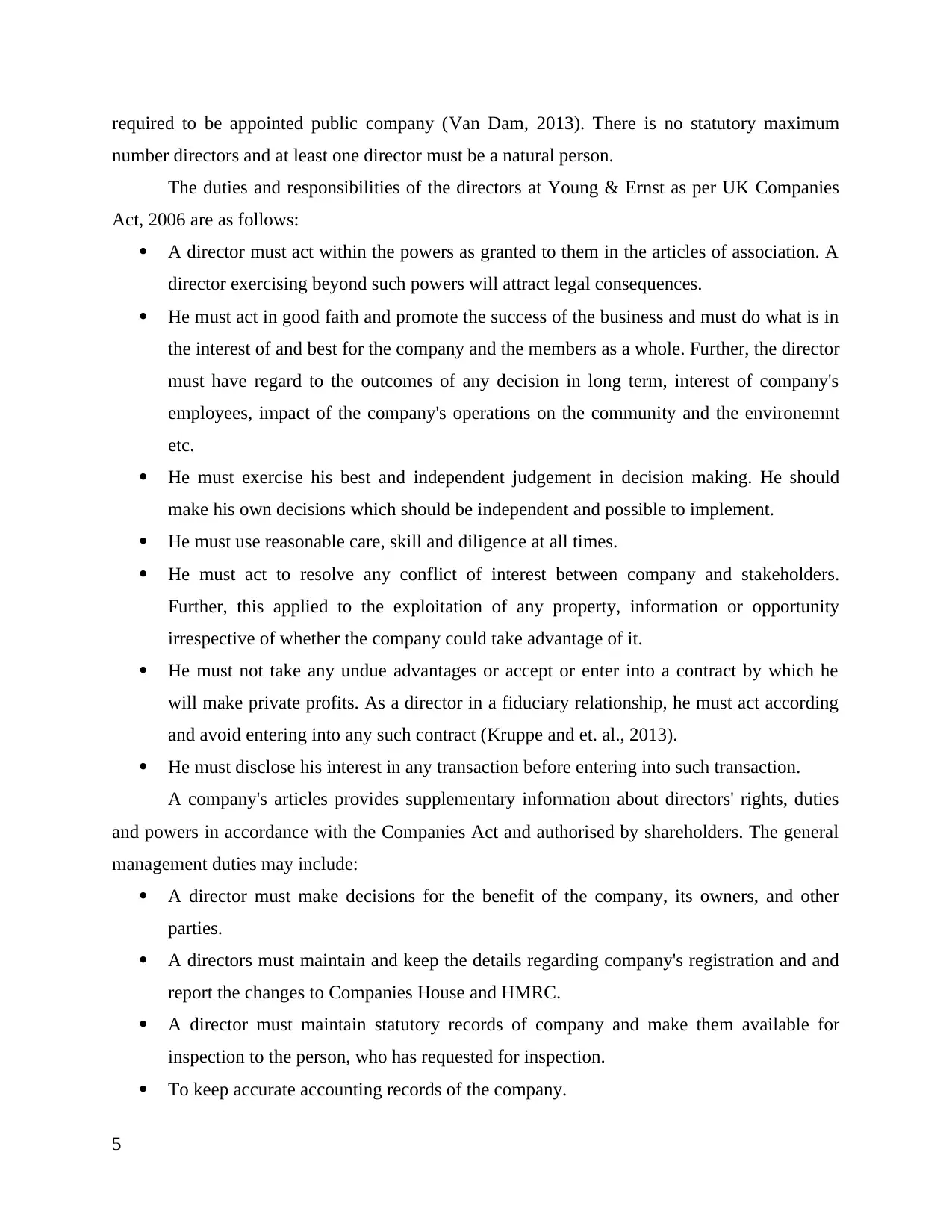
required to be appointed public company (Van Dam, 2013). There is no statutory maximum
number directors and at least one director must be a natural person.
The duties and responsibilities of the directors at Young & Ernst as per UK Companies
Act, 2006 are as follows:
A director must act within the powers as granted to them in the articles of association. A
director exercising beyond such powers will attract legal consequences.
He must act in good faith and promote the success of the business and must do what is in
the interest of and best for the company and the members as a whole. Further, the director
must have regard to the outcomes of any decision in long term, interest of company's
employees, impact of the company's operations on the community and the environemnt
etc.
He must exercise his best and independent judgement in decision making. He should
make his own decisions which should be independent and possible to implement.
He must use reasonable care, skill and diligence at all times.
He must act to resolve any conflict of interest between company and stakeholders.
Further, this applied to the exploitation of any property, information or opportunity
irrespective of whether the company could take advantage of it.
He must not take any undue advantages or accept or enter into a contract by which he
will make private profits. As a director in a fiduciary relationship, he must act according
and avoid entering into any such contract (Kruppe and et. al., 2013).
He must disclose his interest in any transaction before entering into such transaction.
A company's articles provides supplementary information about directors' rights, duties
and powers in accordance with the Companies Act and authorised by shareholders. The general
management duties may include:
A director must make decisions for the benefit of the company, its owners, and other
parties.
A directors must maintain and keep the details regarding company's registration and and
report the changes to Companies House and HMRC.
A director must maintain statutory records of company and make them available for
inspection to the person, who has requested for inspection.
To keep accurate accounting records of the company.
5
number directors and at least one director must be a natural person.
The duties and responsibilities of the directors at Young & Ernst as per UK Companies
Act, 2006 are as follows:
A director must act within the powers as granted to them in the articles of association. A
director exercising beyond such powers will attract legal consequences.
He must act in good faith and promote the success of the business and must do what is in
the interest of and best for the company and the members as a whole. Further, the director
must have regard to the outcomes of any decision in long term, interest of company's
employees, impact of the company's operations on the community and the environemnt
etc.
He must exercise his best and independent judgement in decision making. He should
make his own decisions which should be independent and possible to implement.
He must use reasonable care, skill and diligence at all times.
He must act to resolve any conflict of interest between company and stakeholders.
Further, this applied to the exploitation of any property, information or opportunity
irrespective of whether the company could take advantage of it.
He must not take any undue advantages or accept or enter into a contract by which he
will make private profits. As a director in a fiduciary relationship, he must act according
and avoid entering into any such contract (Kruppe and et. al., 2013).
He must disclose his interest in any transaction before entering into such transaction.
A company's articles provides supplementary information about directors' rights, duties
and powers in accordance with the Companies Act and authorised by shareholders. The general
management duties may include:
A director must make decisions for the benefit of the company, its owners, and other
parties.
A directors must maintain and keep the details regarding company's registration and and
report the changes to Companies House and HMRC.
A director must maintain statutory records of company and make them available for
inspection to the person, who has requested for inspection.
To keep accurate accounting records of the company.
5
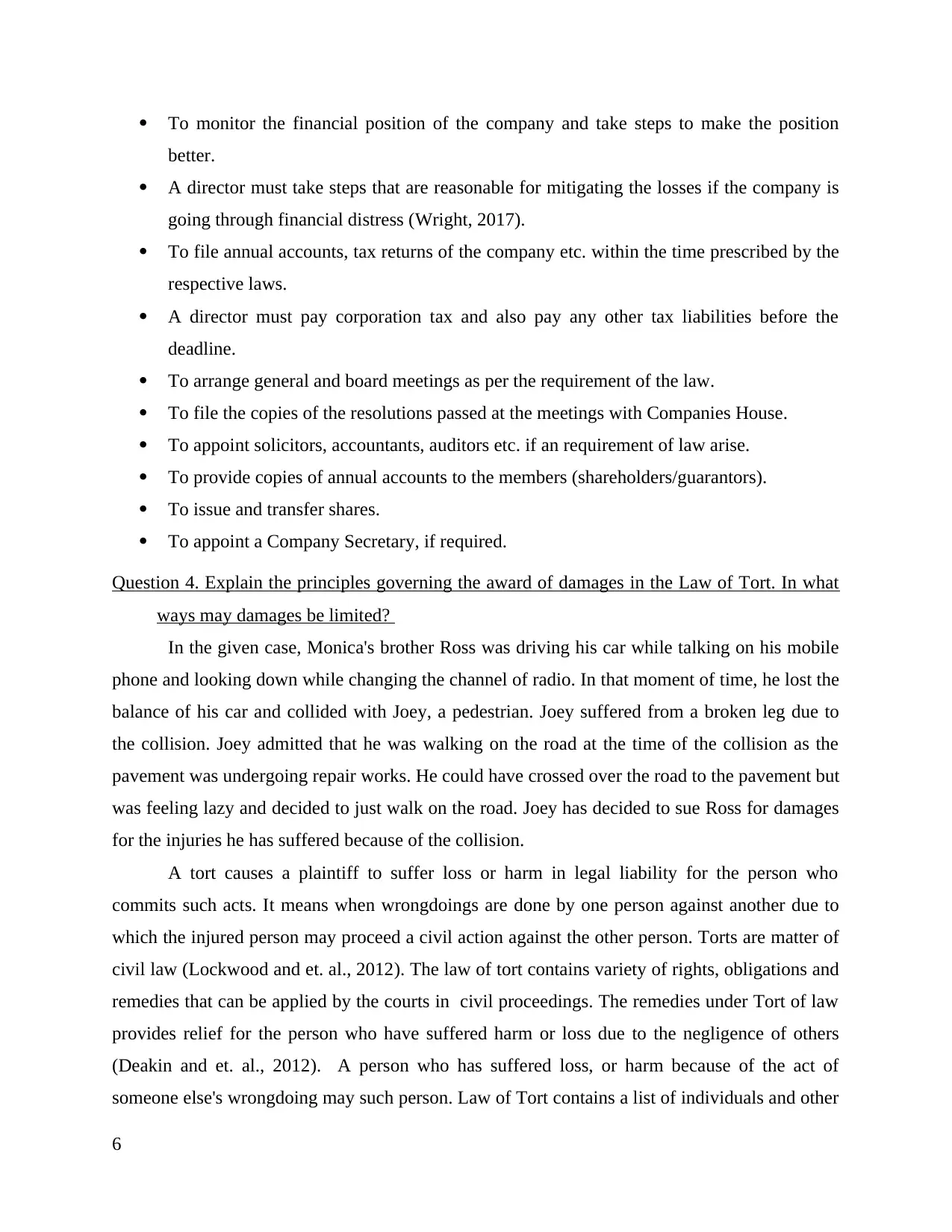
To monitor the financial position of the company and take steps to make the position
better.
A director must take steps that are reasonable for mitigating the losses if the company is
going through financial distress (Wright, 2017).
To file annual accounts, tax returns of the company etc. within the time prescribed by the
respective laws.
A director must pay corporation tax and also pay any other tax liabilities before the
deadline.
To arrange general and board meetings as per the requirement of the law.
To file the copies of the resolutions passed at the meetings with Companies House.
To appoint solicitors, accountants, auditors etc. if an requirement of law arise.
To provide copies of annual accounts to the members (shareholders/guarantors).
To issue and transfer shares.
To appoint a Company Secretary, if required.
Question 4. Explain the principles governing the award of damages in the Law of Tort. In what
ways may damages be limited?
In the given case, Monica's brother Ross was driving his car while talking on his mobile
phone and looking down while changing the channel of radio. In that moment of time, he lost the
balance of his car and collided with Joey, a pedestrian. Joey suffered from a broken leg due to
the collision. Joey admitted that he was walking on the road at the time of the collision as the
pavement was undergoing repair works. He could have crossed over the road to the pavement but
was feeling lazy and decided to just walk on the road. Joey has decided to sue Ross for damages
for the injuries he has suffered because of the collision.
A tort causes a plaintiff to suffer loss or harm in legal liability for the person who
commits such acts. It means when wrongdoings are done by one person against another due to
which the injured person may proceed a civil action against the other person. Torts are matter of
civil law (Lockwood and et. al., 2012). The law of tort contains variety of rights, obligations and
remedies that can be applied by the courts in civil proceedings. The remedies under Tort of law
provides relief for the person who have suffered harm or loss due to the negligence of others
(Deakin and et. al., 2012). A person who has suffered loss, or harm because of the act of
someone else's wrongdoing may such person. Law of Tort contains a list of individuals and other
6
better.
A director must take steps that are reasonable for mitigating the losses if the company is
going through financial distress (Wright, 2017).
To file annual accounts, tax returns of the company etc. within the time prescribed by the
respective laws.
A director must pay corporation tax and also pay any other tax liabilities before the
deadline.
To arrange general and board meetings as per the requirement of the law.
To file the copies of the resolutions passed at the meetings with Companies House.
To appoint solicitors, accountants, auditors etc. if an requirement of law arise.
To provide copies of annual accounts to the members (shareholders/guarantors).
To issue and transfer shares.
To appoint a Company Secretary, if required.
Question 4. Explain the principles governing the award of damages in the Law of Tort. In what
ways may damages be limited?
In the given case, Monica's brother Ross was driving his car while talking on his mobile
phone and looking down while changing the channel of radio. In that moment of time, he lost the
balance of his car and collided with Joey, a pedestrian. Joey suffered from a broken leg due to
the collision. Joey admitted that he was walking on the road at the time of the collision as the
pavement was undergoing repair works. He could have crossed over the road to the pavement but
was feeling lazy and decided to just walk on the road. Joey has decided to sue Ross for damages
for the injuries he has suffered because of the collision.
A tort causes a plaintiff to suffer loss or harm in legal liability for the person who
commits such acts. It means when wrongdoings are done by one person against another due to
which the injured person may proceed a civil action against the other person. Torts are matter of
civil law (Lockwood and et. al., 2012). The law of tort contains variety of rights, obligations and
remedies that can be applied by the courts in civil proceedings. The remedies under Tort of law
provides relief for the person who have suffered harm or loss due to the negligence of others
(Deakin and et. al., 2012). A person who has suffered loss, or harm because of the act of
someone else's wrongdoing may such person. Law of Tort contains a list of individuals and other
6
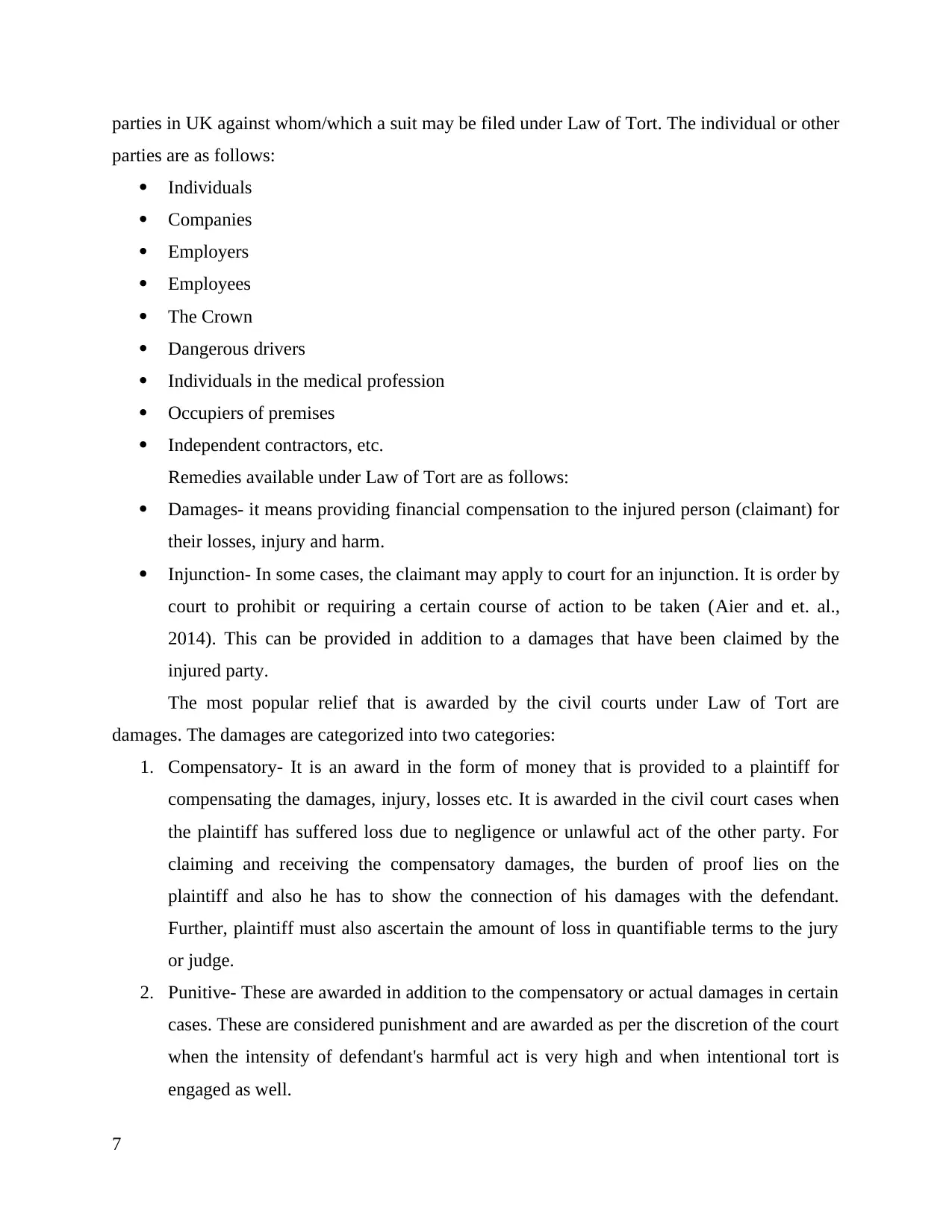
parties in UK against whom/which a suit may be filed under Law of Tort. The individual or other
parties are as follows:
Individuals
Companies
Employers
Employees
The Crown
Dangerous drivers
Individuals in the medical profession
Occupiers of premises
Independent contractors, etc.
Remedies available under Law of Tort are as follows:
Damages- it means providing financial compensation to the injured person (claimant) for
their losses, injury and harm.
Injunction- In some cases, the claimant may apply to court for an injunction. It is order by
court to prohibit or requiring a certain course of action to be taken (Aier and et. al.,
2014). This can be provided in addition to a damages that have been claimed by the
injured party.
The most popular relief that is awarded by the civil courts under Law of Tort are
damages. The damages are categorized into two categories:
1. Compensatory- It is an award in the form of money that is provided to a plaintiff for
compensating the damages, injury, losses etc. It is awarded in the civil court cases when
the plaintiff has suffered loss due to negligence or unlawful act of the other party. For
claiming and receiving the compensatory damages, the burden of proof lies on the
plaintiff and also he has to show the connection of his damages with the defendant.
Further, plaintiff must also ascertain the amount of loss in quantifiable terms to the jury
or judge.
2. Punitive- These are awarded in addition to the compensatory or actual damages in certain
cases. These are considered punishment and are awarded as per the discretion of the court
when the intensity of defendant's harmful act is very high and when intentional tort is
engaged as well.
7
parties are as follows:
Individuals
Companies
Employers
Employees
The Crown
Dangerous drivers
Individuals in the medical profession
Occupiers of premises
Independent contractors, etc.
Remedies available under Law of Tort are as follows:
Damages- it means providing financial compensation to the injured person (claimant) for
their losses, injury and harm.
Injunction- In some cases, the claimant may apply to court for an injunction. It is order by
court to prohibit or requiring a certain course of action to be taken (Aier and et. al.,
2014). This can be provided in addition to a damages that have been claimed by the
injured party.
The most popular relief that is awarded by the civil courts under Law of Tort are
damages. The damages are categorized into two categories:
1. Compensatory- It is an award in the form of money that is provided to a plaintiff for
compensating the damages, injury, losses etc. It is awarded in the civil court cases when
the plaintiff has suffered loss due to negligence or unlawful act of the other party. For
claiming and receiving the compensatory damages, the burden of proof lies on the
plaintiff and also he has to show the connection of his damages with the defendant.
Further, plaintiff must also ascertain the amount of loss in quantifiable terms to the jury
or judge.
2. Punitive- These are awarded in addition to the compensatory or actual damages in certain
cases. These are considered punishment and are awarded as per the discretion of the court
when the intensity of defendant's harmful act is very high and when intentional tort is
engaged as well.
7
Secure Best Marks with AI Grader
Need help grading? Try our AI Grader for instant feedback on your assignments.
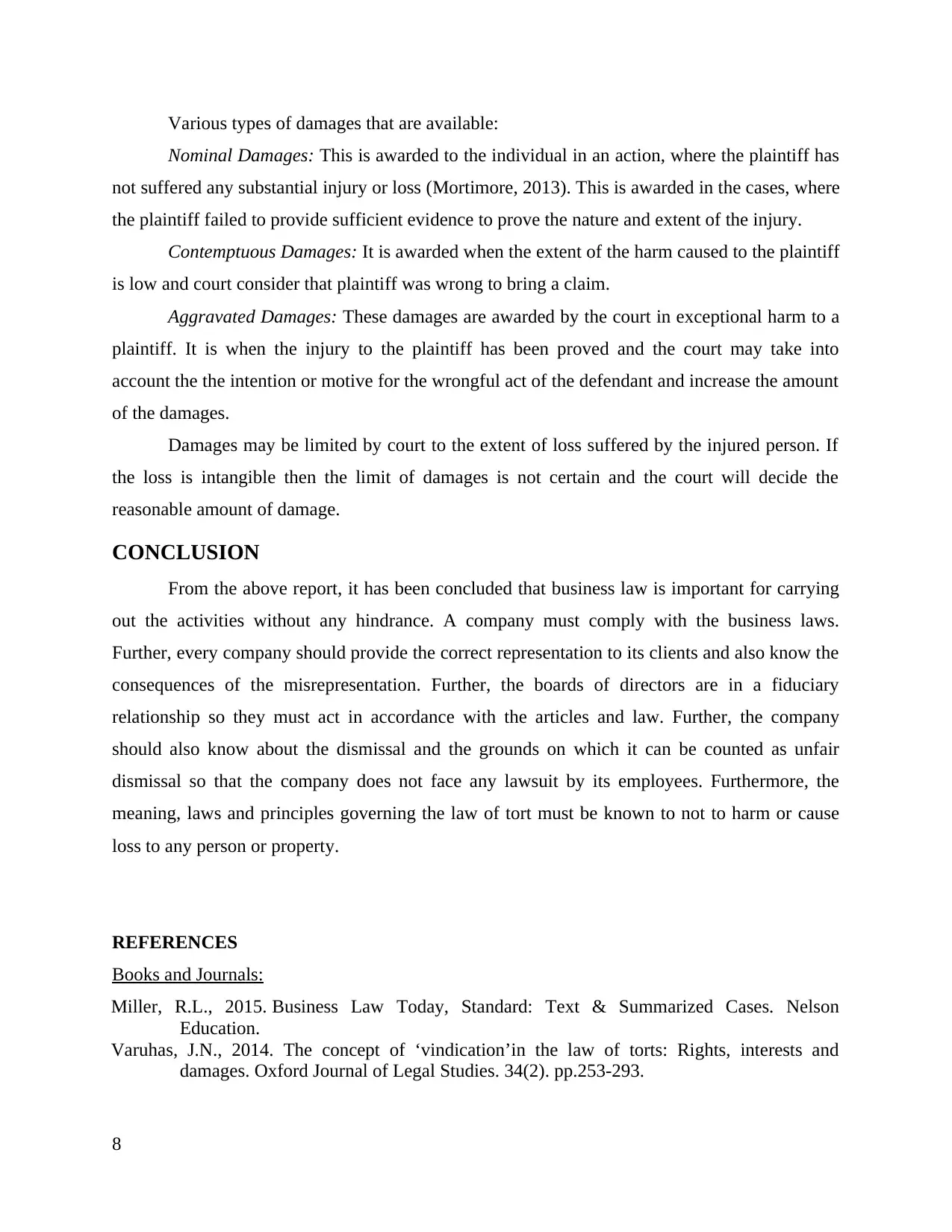
Various types of damages that are available:
Nominal Damages: This is awarded to the individual in an action, where the plaintiff has
not suffered any substantial injury or loss (Mortimore, 2013). This is awarded in the cases, where
the plaintiff failed to provide sufficient evidence to prove the nature and extent of the injury.
Contemptuous Damages: It is awarded when the extent of the harm caused to the plaintiff
is low and court consider that plaintiff was wrong to bring a claim.
Aggravated Damages: These damages are awarded by the court in exceptional harm to a
plaintiff. It is when the injury to the plaintiff has been proved and the court may take into
account the the intention or motive for the wrongful act of the defendant and increase the amount
of the damages.
Damages may be limited by court to the extent of loss suffered by the injured person. If
the loss is intangible then the limit of damages is not certain and the court will decide the
reasonable amount of damage.
CONCLUSION
From the above report, it has been concluded that business law is important for carrying
out the activities without any hindrance. A company must comply with the business laws.
Further, every company should provide the correct representation to its clients and also know the
consequences of the misrepresentation. Further, the boards of directors are in a fiduciary
relationship so they must act in accordance with the articles and law. Further, the company
should also know about the dismissal and the grounds on which it can be counted as unfair
dismissal so that the company does not face any lawsuit by its employees. Furthermore, the
meaning, laws and principles governing the law of tort must be known to not to harm or cause
loss to any person or property.
REFERENCES
Books and Journals:
Miller, R.L., 2015. Business Law Today, Standard: Text & Summarized Cases. Nelson
Education.
Varuhas, J.N., 2014. The concept of ‘vindication’in the law of torts: Rights, interests and
damages. Oxford Journal of Legal Studies. 34(2). pp.253-293.
8
Nominal Damages: This is awarded to the individual in an action, where the plaintiff has
not suffered any substantial injury or loss (Mortimore, 2013). This is awarded in the cases, where
the plaintiff failed to provide sufficient evidence to prove the nature and extent of the injury.
Contemptuous Damages: It is awarded when the extent of the harm caused to the plaintiff
is low and court consider that plaintiff was wrong to bring a claim.
Aggravated Damages: These damages are awarded by the court in exceptional harm to a
plaintiff. It is when the injury to the plaintiff has been proved and the court may take into
account the the intention or motive for the wrongful act of the defendant and increase the amount
of the damages.
Damages may be limited by court to the extent of loss suffered by the injured person. If
the loss is intangible then the limit of damages is not certain and the court will decide the
reasonable amount of damage.
CONCLUSION
From the above report, it has been concluded that business law is important for carrying
out the activities without any hindrance. A company must comply with the business laws.
Further, every company should provide the correct representation to its clients and also know the
consequences of the misrepresentation. Further, the boards of directors are in a fiduciary
relationship so they must act in accordance with the articles and law. Further, the company
should also know about the dismissal and the grounds on which it can be counted as unfair
dismissal so that the company does not face any lawsuit by its employees. Furthermore, the
meaning, laws and principles governing the law of tort must be known to not to harm or cause
loss to any person or property.
REFERENCES
Books and Journals:
Miller, R.L., 2015. Business Law Today, Standard: Text & Summarized Cases. Nelson
Education.
Varuhas, J.N., 2014. The concept of ‘vindication’in the law of torts: Rights, interests and
damages. Oxford Journal of Legal Studies. 34(2). pp.253-293.
8
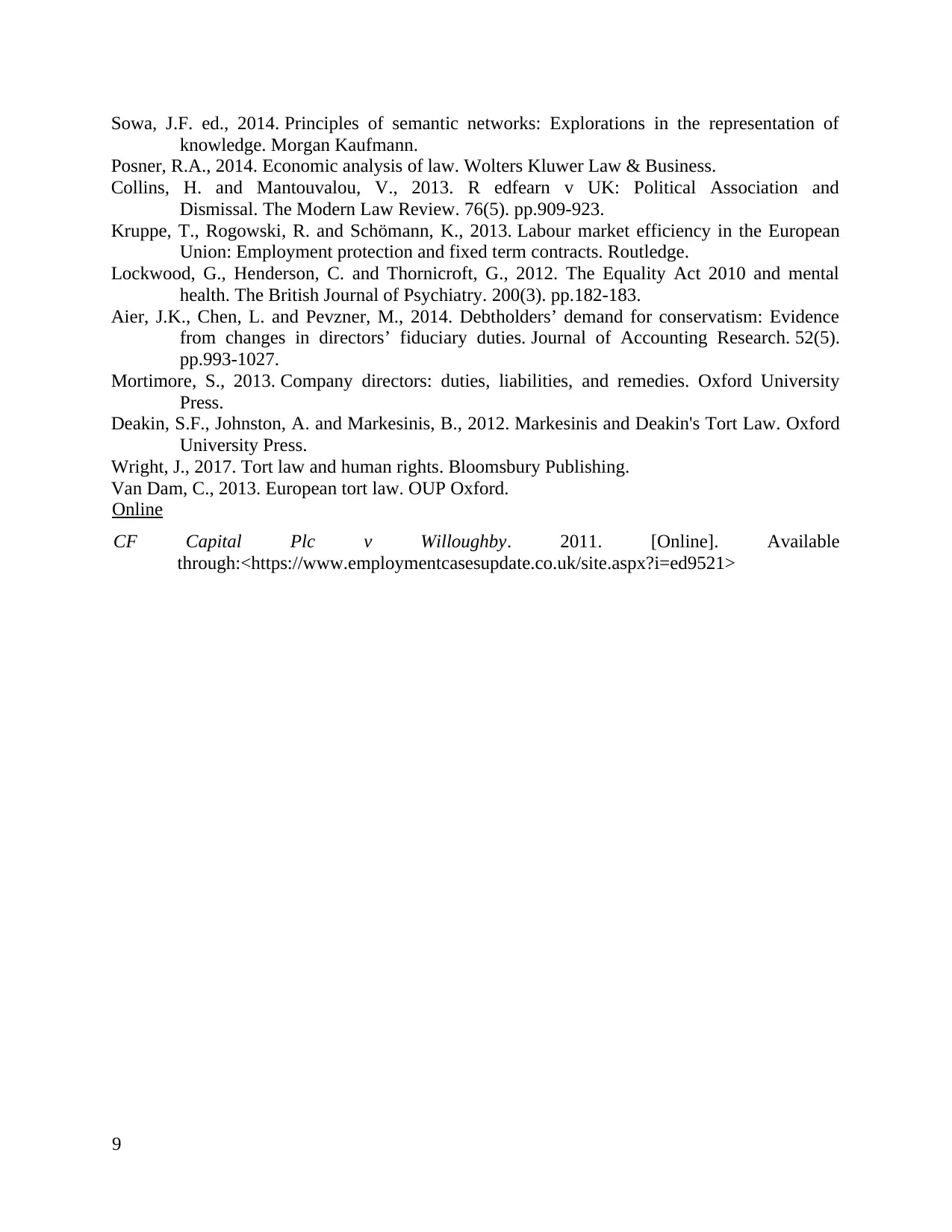
Sowa, J.F. ed., 2014. Principles of semantic networks: Explorations in the representation of
knowledge. Morgan Kaufmann.
Posner, R.A., 2014. Economic analysis of law. Wolters Kluwer Law & Business.
Collins, H. and Mantouvalou, V., 2013. R edfearn v UK: Political Association and
Dismissal. The Modern Law Review. 76(5). pp.909-923.
Kruppe, T., Rogowski, R. and Schömann, K., 2013. Labour market efficiency in the European
Union: Employment protection and fixed term contracts. Routledge.
Lockwood, G., Henderson, C. and Thornicroft, G., 2012. The Equality Act 2010 and mental
health. The British Journal of Psychiatry. 200(3). pp.182-183.
Aier, J.K., Chen, L. and Pevzner, M., 2014. Debtholders’ demand for conservatism: Evidence
from changes in directors’ fiduciary duties. Journal of Accounting Research. 52(5).
pp.993-1027.
Mortimore, S., 2013. Company directors: duties, liabilities, and remedies. Oxford University
Press.
Deakin, S.F., Johnston, A. and Markesinis, B., 2012. Markesinis and Deakin's Tort Law. Oxford
University Press.
Wright, J., 2017. Tort law and human rights. Bloomsbury Publishing.
Van Dam, C., 2013. European tort law. OUP Oxford.
Online
CF Capital Plc v Willoughby. 2011. [Online]. Available
through:<https://www.employmentcasesupdate.co.uk/site.aspx?i=ed9521>
9
knowledge. Morgan Kaufmann.
Posner, R.A., 2014. Economic analysis of law. Wolters Kluwer Law & Business.
Collins, H. and Mantouvalou, V., 2013. R edfearn v UK: Political Association and
Dismissal. The Modern Law Review. 76(5). pp.909-923.
Kruppe, T., Rogowski, R. and Schömann, K., 2013. Labour market efficiency in the European
Union: Employment protection and fixed term contracts. Routledge.
Lockwood, G., Henderson, C. and Thornicroft, G., 2012. The Equality Act 2010 and mental
health. The British Journal of Psychiatry. 200(3). pp.182-183.
Aier, J.K., Chen, L. and Pevzner, M., 2014. Debtholders’ demand for conservatism: Evidence
from changes in directors’ fiduciary duties. Journal of Accounting Research. 52(5).
pp.993-1027.
Mortimore, S., 2013. Company directors: duties, liabilities, and remedies. Oxford University
Press.
Deakin, S.F., Johnston, A. and Markesinis, B., 2012. Markesinis and Deakin's Tort Law. Oxford
University Press.
Wright, J., 2017. Tort law and human rights. Bloomsbury Publishing.
Van Dam, C., 2013. European tort law. OUP Oxford.
Online
CF Capital Plc v Willoughby. 2011. [Online]. Available
through:<https://www.employmentcasesupdate.co.uk/site.aspx?i=ed9521>
9
1 out of 12
Related Documents
Your All-in-One AI-Powered Toolkit for Academic Success.
+13062052269
info@desklib.com
Available 24*7 on WhatsApp / Email
![[object Object]](/_next/static/media/star-bottom.7253800d.svg)
Unlock your academic potential
© 2024 | Zucol Services PVT LTD | All rights reserved.
![[PDF] Introduction to Contract Law](/_next/image/?url=https%3A%2F%2Fdesklib.com%2Fmedia%2Fimages%2Fuu%2F867812d366884843947a2d332272dbcf.jpg&w=256&q=75)




